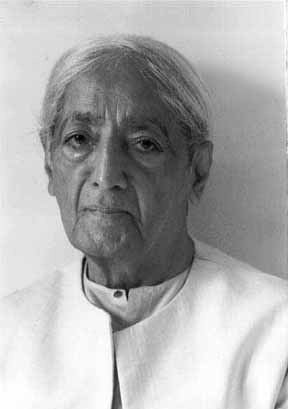
I am tempted to repeat a story about a great disciple going to God and demanding to be taught truth. This poor God says, `My friend, it is such a hot day, please get me a glass of water.’ So the disciple goes out and knocks on the door of the first house he comes to and a beautiful young lady opens the door. The disciple falls in love with her and they marry and have several children.
Then one day it begins to rain, and keeps on raining, raining, raining – the torrents are swollen, the streets are full, the houses are being washed away. The disciple holds on to his wife and carries his children on his shoulders and as he is being swept away he calls out, ‘Lord, please save me’, and the Lord says, `Where is that glass of water I asked for?’
It is rather a good story because most of us think in terms of time. Man lives by time. Inventing the future has been a favorite game of escape.
We think that changes in ourselves can come about in time, that order in ourselves can be built up little by little, added to day by day. But time doesn’t bring order or peace, so we must stop thinking in terms of gradualness. This means that there is no tomorrow for us to be peaceful in. We have to be orderly on the instant.
When there is real danger time disappears, doesn’t it? There is immediate action. But we do not see the danger of many of our problems and therefore we invent time as a means of overcoming them. Time is a deceiver as it doesn’t do a thing to help us bring about a change in ourselves. Time is a movement which man has divided into past, present and future, and as long as he divides it he will always be in conflict.
Is learning a matter of time? We have not learnt after all these thousands of years that there is a better way to live than by hating and killing each other. The problem of time is a very important one to understand if we are to resolve this life which we have helped to make as monstrous and meaningless as it is.
We are confused about our many problems and lost in that confusion. Now if one is lost in a wood, what is the first thing one does? One stops, doesn’t one? One stops and looks round.
But the more we are confused and lost in life the more we chase around, searching, asking, demanding, begging. So the first thing, if I may suggest it, is that you completely stop inwardly. And when you do stop inwardly, psychologically, your mind becomes very peaceful, very clear. Then you can really look at this question of time.
When we meet a challenge partially, fragmentarily, or try to escape from it – that is, when we meet it without complete attention – we bring about a problem. And the problem continues so long as we continue to give it incomplete attention
Excerpted from Freedom From the Known, Chapter 9, at www.jiddu-krishnamurti.net. The 119th birth anniversary of J. Krishnamurti was observed on May 11
J. Krishnamurti






